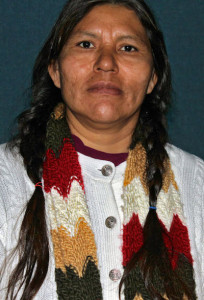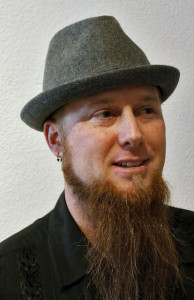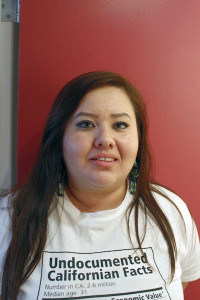by We’Ced reporters
photos by Alyssa Castro and We’Ced reporters
Ed Note: On January 31st, Merced resident and film maker Rodrigo Reyes screened Purgatorio: A Journey Into the Heart of the Border. Co-sponsored by Merced Organizing Project and Building Healthy Communities, the screening was paired with a panel afterwards that facilitated a conversation around the importance of addressing the needs of the undocumented population in Merced County, estimated by a USC and SDSU study to be near 25,000..
The jarring and affecting documentary has screened in film festivals across the nation and even the world, but this was the first official screening in the film maker’s own community. After the film and panel, We’Ced reporters spoke with folks in attendance to hear reflections after viewing Purgatorio and the ways in which our community feels the effects of the border.
Guadalupe Carbajal
El documental Purgatorio me toco mucho. Hubo varias partes que me tocaron mucho. Las escenas del océano y el mar. Yo cuando era niña en Nayarit iba al mar y jugaba en el mar. De alguna manera dicen que el mar representa la vida. Eso quiere decir que yo por eso de alguna manera no le he tenido miedo a la vida.
Desde que tenia los 12 años, cuando se murio mi mama, ya no he volvido a tener contacto con mi comunidad Indígena. A veces me sentía perdida y me preguntaba yo, porque estoy tan aca? Cual es el propósito? Cual es el plan?
Nosotros los indocumentados nos sentimos como entre la espada y la pared. Sentimos que no podemos pedir tanto porque quienes somos? Ni siquiera somos ciudadanos de este país. Pero a la misma vez dice uno, no puedo callar tanto. Tengo que levantar la frente. He cometido errores, sí, pero tengo que seguir para delante y yo tengo que enseñar a los otros que por encima de mis errores, yo valgo y soy especial.
Por ejemplo, yo siempre voy a la escuela con lo que tengo para ponerme. No voy para que me miren ni para que me digan si estoy bien o estoy mal. Yo estoy ahí por mis hijos. No todos somos tan valientes. Hay personas que van a la escuela y no se mastican bien el Inglés y ven a las personas con dinero y se avergüenzan, ya no voy a esa escuela. No, uno tiene que volver una y otra vez y otra vez y otra vez. Por que? Porqué es la vida de mis hijos. Usted cree que yo quiero que mis hijos pasen lo que yo he pasado?
Si yo tuviera papeles, estaría en la universidad. Pero como no tengo, me tengo que aguantar!
The documentary Purgatorio moved me deeply. The scenes with the ocean especially so. When I was a young girl in Nayarit I used to go to the sea and play in it. People say that the sea represents life so maybe that’s why I haven’t ever feared my life.
Since I was 12 years old, when my mother died, I have not had any contact with my indigenous community. Sometimes I have felt lost here in this country and I’ve asked myself, ‘why am I here? what is my purpose? what is my plan?’
Undocumented people feel like we are between a rock and a hard place. We feel like we can’t ask for too much because who are we anyways? We aren’t even citizens here. At the same time though, I tell myself that I can’t keep quiet. I need to keep my head up. I’ve made mistakes like anyone else, sure, but I have to keep moving forward and show others that despite my shortcomings, I’m of value and I’m special.
For example, I always go to my children’s schools, even if I have to wear something other people may consider strange. I don’t go to be looked at or judged. I’m there for my kids. But not everyone is that brave. There’s people that go to these schools and can’t handle English too well and see people with means and they feel embarrassed. They won’t want to return to that school. I say one must go back again and again and again. Why? Because that’s my children’s lives. Do you think I want my children to go through what I’ve gone through?
If I had papers I’d be inside a university right now. But since I don’t, I have to suck it up and move forward.
Jayson Sargent, 38
I think a lot of the documentary was disturbing but needed to be seen. The perseverance of the people trying to get across the border stood out to me. I think that’s always overlooked when people talk about ‘being illegal.’
Somebody in the audience made a very good point during the panel after the film: people don’t care about borders between rich countries, they only care about borders between rich and poor countries.
Crisantema Gallardo, 24
There’s a lot of trauma in our community around immigration and what being undocumented in Merced means. I’m a U.S. citizen but my parents are undocumented. I see firsthand the way they have internalized this feeling of being a second-class citizen and feeling like they’re less than because they don’t speak English or because they don’t have the best jobs. They work in the fields so they feel like they are not treated with the dignity that everyone else is.
Growing up I was a very angry youth because I would see the way other folks would interact with my parents. As an organizer now I work with a lot of mixed-status families who [because of immigration issues] aren’t even speaking to each other. Brothers who don’t speak to each other because one is a U.S. citizen and the other is undocumented.
In order for our community as a whole to really begin the healing process we need to engage in these kinds of conversations. How do you feel as an undocumented person in our community? What can we do as allies to really create healthy communities?
A small victory would be getting health coverage for them. It’s going to take all of us talking about this to really come together and make that happen. I think of my father. Since he arrived to this country he’s been working in the fields and paying his taxes. He still lacks basic health coverage. It’s estimated that there are 10,000 undocumented Mercedians in our county who contribute to our economy yet lack health coverage.
Right now my dad is disabled after working 30 years in the field. He suffers from sciatica and is in pain 24 hours a day. The doctor told him if had gotten regular check-ups, this could have been prevented but now he can’t even walk anymore.
I know it’s a reality not just for my father but for thousands of folks in Merced. Health care is a human right; we deserve health coverage.
 Translate
Translate



